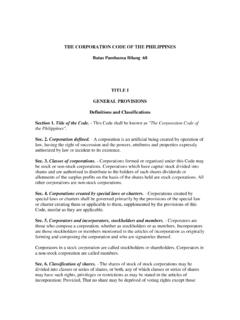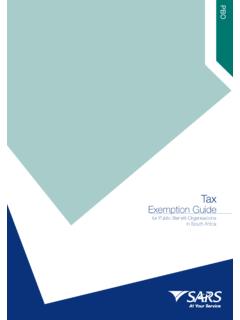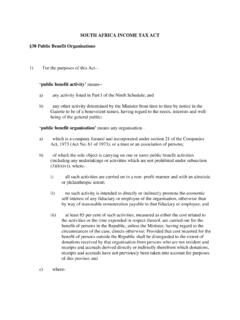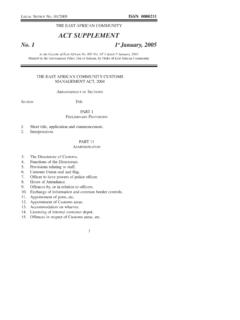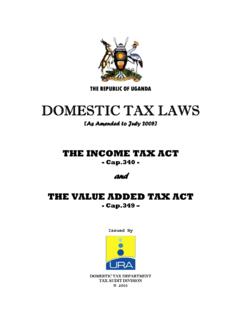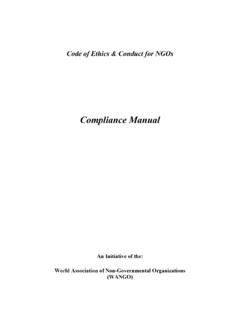Transcription of THE NON-GOVERNMENTAL ORGANIZATIONS CO …
1 THE NON-GOVERNMENTAL ORGANIZATIONS CO-ORDINATION ACT, 1990 (KENYA) No. 19 of 1990 Date of Assent: 14th January, 1991 Date of Commencement: By Notice ARRANGEMENT OF SECTIONS Section PART 1 PRELIMINARY 1. Short title and commencement 2. Interpretation PART II ESTABLISHMENT, FUNCTIONS AND POWERS OF THE BOARD 3. Establishment of the Board 4. Composition of the Board 5. Executive Director 6. Procedure at meetings of the Board 7. Functions of the Board 8. Powers of the Board 9. Documentation Centre PART III REGISTRATION AND LICENSING OF NON-GOVERNMENTAL ORGANIZATIONS 10. Registration of NON-GOVERNMENTAL ORGANIZATIONS 11.
2 Fees 12. Certificate of Registration 13. Validity of certificate 14. Refusal of registration 15. Renewal of certificate 16. Cancellation of certificate 17. Work permit 18. Board may require proof of existence 19. Appeals 20. Exempt ORGANIZATIONS 21. Privileges 22. Offences and penalties PART IV SELF-REGULATION BY THE NON-GOVERNMENTAL ORGANIZATIONS 23. Establishment of the Council 24. Code of Conduct PART V TRANSITIONAL ARRANGEMENTS 25. Transitional period 26. Membership of interim council PART VI FINANCIAL PROVISIONS 27. Financial year of the Board 28 Investments 29.
3 Annual estimates 30. Books of accounts 31. Audit of accounts PART VII MISCALLANEOUS PROVISIONS 32. Rules 33. Uttering false statements 34. Annual estimates 35. Custody of Common Seal An Act of Parliament to make provison for the registration and co-ordination of NON-GOVERNMENTAL ORGANIZATIONS in Kenya and for connected purposes ENACTED by the Parliament of Kenya as follows PART 1 PRELIMINARY 1. This Act may be cited as the NON-GOVERNMENTAL ORGANIZATIONS Co-ordination Act, 1990, and shall come into operation on such a day as the Minister may, by notice in the Gazette specify.
4 2. In this Act, unless the context otherwise requires Board means the NON-GOVERNMENTAL ORGANIZATIONS Co-ordination Board established by section (3)1; Bureau means the executive directorate of the Board; Certificate means certificate of registration issued under Part III; Council means the National Council of Voluntary Agencies established under section 24; International NON-GOVERNMENTAL organization means a NON-GOVERNMENTAL organization with the original incorporation in one or more countries other than Kenya, but operation within Kenya under a certificate of registration; National NON-GOVERNMENTAL organization means a NON-GOVERNMENTAL organization which is registered exclusively in Kenya with authority to operate within or across two or more districts in Kenya; NON-GOVERNMENTAL organization means a private voluntary grouping of individuals or associations, not operated for profit or for other commercial purposes but which have organized themselves nationally or internationally for the promotion of social welfare, development, charity or research through mobilization of resources.
5 Register means the register of NON-GOVERNMENTAL ORGANIZATIONS maintained by the Board. PART II ESTABLISHMENT, FUNCTIONS AND POWERS OF THE BOARD 3. (1) There is hereby established a Board to be known as the NON-GOVERNMENTAL ORGANIZATIONS Co-ordinations Board. (2) The Board shall be a body corporate with perpetual succession and a common seal and shall be capable in its corporate name of (a) suing and being sued (b) taking, purchasing or otherwise acquiring, holding, charging or disposing of movable and immovable property; (c) receiving, borrowing and lending money; (d) entering into contracts; and (e) doing or performing all such other things or acts necessary for the proper performance of its functions under this Act, which may lawfully be done or performed by a body corporate.
6 4. (1) The Board shall consist of (a) a chairman appointed by the President; (b) not more than seven and not less than five members appointed by the Minister by virtue of their knowledge or experience in development and welfare management; (c) the Permanent Secretary in the Office of the President responsible for NON-GOVERNMENTAL ORGANIZATIONS ; (d) the Permanent Secretary in the Ministry for the time being responsible for foreign affairs; (e) the Permanent Secretary to the Treasury; (f) the Permanent Secretary in the Ministry for the time being responsible for economic planning; (g) the Permanent Secretary in the Ministry for the time being responsible for social service; (h) the Attorney-General; (i) five members appointed by the Minister on the recommendation of the Council to represent the diversified areas of NON-GOVERNMENTAL ORGANIZATIONS interests within the Board; (j) the executive director appointed under section 5 (1).
7 (2) The members of the Board, other than ex-officio members shall hold office for a period of three years and shall then retire, but shall be eligible for re-appointment. (3) A member of the Board, other than an ex-officio member, may resign his appointment by a letter addressed to the Minister. (4) The Board may co-opt such number of persons not exceeding three in number to represent such interests as may be determined by the Board. 5 (1) The Minister may appoint an executive director who shall be the head of the Bureau and responsible for the day to day management of the business of the Board. (2) The executive director shall be an ex-officio member of the Board but shall have no right to vote at any meeting.
8 (3) The executive director shall be the secretary to the Board. 6. (1) The Chairman shall preside at all meetings of the Board, except that in his absence, the provisions of sub-section (2) shall apply. (2) In the event of the chairman being absent from any meeting of the Board, the members present shall elect one of the members present at the meeting to preside. (3) The Board shall meet at least four times in each year but the chairman may, and upon application by six members shall, convene a special meeting of the Board. (4) The quorum necessary for the transaction of the business of the Board shall be eleven, including at least seven members appointed under paragraph (b) and (i) of subsection (1) of section 4.
9 (5) All questions at a meeting of the Board shall be determined by a simple majority of the votes of the members present and voting. (6) The chairman shall have, in case of equality of votes, a casting vote in addition to his deliberative vote. (7) The Board shall cause the minutes of all proceedings of meetings of the Board to be entered in books kept for that purpose. (8) Subject to this Act, the Board shall regulate its own proceedings. 7. The functions of the Board shall be (a) to facilitate and co-ordinate the work of all national and international NON-GOVERNMENTAL ORGANIZATIONS operating in Kenya; (b) to maintain the register of national and international NON-GOVERNMENTAL ORGANIZATIONS operating in Kenya, with the precise sectors, affiliations and locations of their activities; (c) to receive and discuss the annual reports of the NON-GOVERNMENTAL organization ; (d) to advise the Government on the activities of the NON-GOVERNMENTAL ORGANIZATIONS and their role in development within Kenya.
10 (e) to conduct a regular review of the register to determine the consistency with the reports submitted by the NON-GOVERNMENTAL ORGANIZATIONS and the Council; (f) to provide policy guidelines to the NON-GOVERNMENTAL ORGANIZATIONS for harmonizing their activities to the national development plan for Kenya; (g) to receive, discuss and approve the regular reports of the Council and to advise on strategies for efficient planning and co-ordination of the activities of the NON-GOVERNMENTAL ORGANIZATIONS in Kenya; and (h) to receive, discuss and approve the code of conduct prepared by the Council for self-regulation of the NON-GOVERNMENTAL ORGANIZATIONS and the activities in Kenya.


